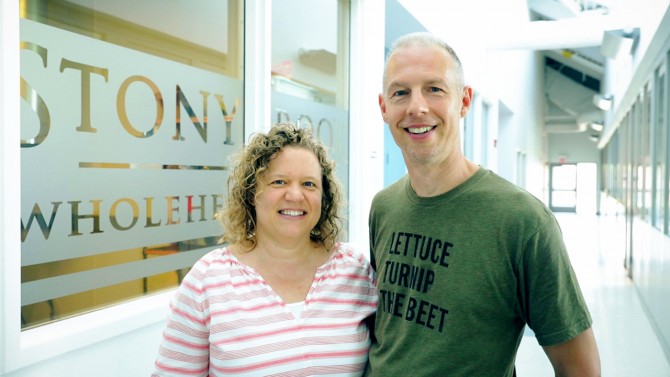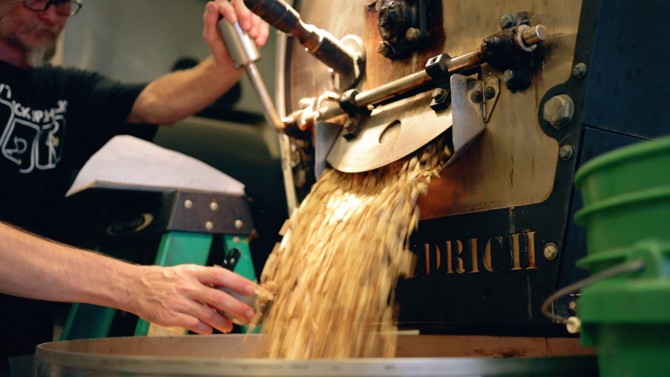Stony Brook Wholehearted Foods is the only company in the U.S. producing culinary oil from vegetable seed waste.
Cornell expertise leads to sustainable seed oil and snack company
By Krishna Ramanujan
Stony Brook Wholehearted Foods is the only company in the U.S. producing culinary oil from vegetable seed waste, and one of the only producers of culinary butternut squash oils in the northeast.
Greg Woodworth ’94 and Kelly Coughlin ’93, Stony Brook’s owners, started with a cookie company in Boston, until an unexpected encounter – an invitation to help advise a butternut squash farm – changed the course of their business.
Martin Farms, a fifth-generation family farm in Brockport, New York, devotes 3,000 acres to growing butternut squash. They cut, dice and deseed, and sell the processed vegetable at many times the price a whole gourd would fetch. Being the largest producer of diced butternut squash in the Northeast has its drawbacks: What to do with 30 tons of seeds per year?
Woodworth and Coughlin were invited to meet Martin Farm representatives in 2006 by the Cornell Food Venture Center (CFVC), a Geneva-based center that informs and advises small food manufacturers about food-safety standards and regulations and provides tools, techniques and solutions for meeting those codes. Woodworth and Coughlin had already been working with the CFVC to make sure their cookies met food safety codes, and the center’s presence in Geneva was part of the reason they moved their mail-order cookie company from Boston to Geneva in 2006.
At the time, Martin Farms was looking for someone with a small-business manufacturing and culinary background to brainstorm about possibilities for processing their waste stream.
“We found we could expeller-press the seeds and actually get 20 percent oil out of butternut squash seed,” a very good yield by weight, Woodworth said. Grape seed gets 5 percent oil, and on the high end, sunflower yields up to 35 percent oil.
The meeting planted seeds in Woodworth and Coughlin’s minds, and encouraged the efforts that led to securing grant funding from the Farm Viability Institute. Staff at the CFVC loaned them a small bench-top expeller press and an old 10-pound peanut roaster. Woodworth and Coughlin eventually commercialized their oil with guidance from the CFVC, bottled it and began selling it to specialty food retailers in 2008. They phased out manufacturing cookies and Stony Brook Wholehearted Foods was born. Now, the company produces pepita seed snacks, culinary seed oils, seed protein powders and animal feed from fiber waste that comes off the seeds when extracting the oils. They sell their products online, nationally through specialty food retailers, to outlets like Wegmans through regional distributors, and to local health food and gourmet food stores.
“I sincerely believe that the CFVC and Cornell, on a grander scale, has been part of our life in making this happen,” Woodworth said of the center’s access to top-notch food scientists, federal and state agencies, and industry and agricultural connections.
Today, Martin Farms is a partner in Stony Brook Wholehearted Foods.
“The main goal of the company is to upcycle waste streams from the farm into high-end products”, said Bruno Xavier, Ph.D. ’08, a food microbiologist and extension associate at the CFVC.
Stony Brook came into upcycling just as such sustainable practices were gaining traction with the general public, Woodworth said. “It was part of the philosophy of the company initially,” he said.
Stony Brook is working with Cornell AgriTech on using specialty crops like hemp to make a new line of oils. Xavier said the company has a bright future.
“Their company is ripe for the picking; someone will notice their presence in the market,” he said. “They have a valuable brand and a great product line, the next step is to accelerate towards a big expansion or be purchased by a larger company that can use their own platform to do it.”
Media Contact
Get Cornell news delivered right to your inbox.
Subscribe



